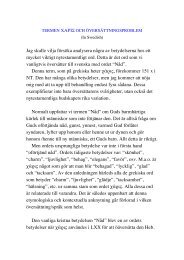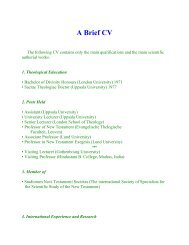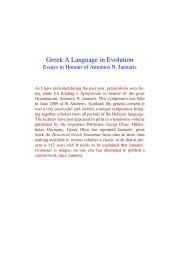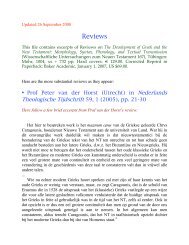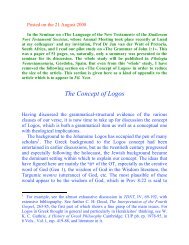Menoun and Menounge in the NT - Chrys-caragounis.com
Menoun and Menounge in the NT - Chrys-caragounis.com
Menoun and Menounge in the NT - Chrys-caragounis.com
Create successful ePaper yourself
Turn your PDF publications into a flip-book with our unique Google optimized e-Paper software.
Someone requested some clarifications on <strong>the</strong> use of menou'n <strong>and</strong> menou'nge <strong>in</strong> <strong>the</strong><br />
<strong>NT</strong>. This is my answer, which may be of some <strong>in</strong>terest to o<strong>the</strong>r readers of my web<br />
site.<br />
Menou'n <strong>and</strong> menou'nge <strong>in</strong> <strong>the</strong> <strong>NT</strong><br />
The first word is <strong>com</strong>pounded of <strong>the</strong> particles mevn <strong>and</strong> ou\n, while <strong>the</strong> second has, <strong>in</strong><br />
addition, <strong>the</strong> particle ge. The follow<strong>in</strong>g analysis is important, because <strong>the</strong><br />
<strong>com</strong>pounded words sometimes have acquired a new mean<strong>in</strong>g, while at o<strong>the</strong>r times<br />
<strong>the</strong>y preserve <strong>the</strong> <strong>in</strong>dividual mean<strong>in</strong>gs of <strong>the</strong> words of which <strong>the</strong>y are <strong>com</strong>pounded.<br />
1. Asseverative Uses of mevn<br />
The word mevn is both a confirmatory, asseverative particle used <strong>in</strong> solemn<br />
affirmations as well as an adversative conjunction used to <strong>in</strong>dicate contrast or<br />
opposition, particularly with dev (e.g. me;n ... de; ... , oiJ me;n ... oiJ de; ...).<br />
What <strong>in</strong>terests us at this juncture are <strong>the</strong> confirmatory, asseverative uses of this<br />
particle. As I have shown <strong>in</strong> my study «The use of Interrogative, Confirmatory, <strong>and</strong><br />
Asseverative Particles (eij - h\, h[ - h\, h\ mhvn [hjmhvn] h\ mevn, eij mhvn) <strong>in</strong> <strong>the</strong> Septuag<strong>in</strong>t» 1<br />
mevn is occasionally used <strong>in</strong> lieu of <strong>the</strong> somewhat stronger mhvn, i.e. <strong>in</strong> <strong>the</strong> expression<br />
h\ mevn (e.g. Homeros, Odysseia, X.65: h\ me;n s∆ ejndukevw" ajpepevmpomen “Surely we<br />
sent you off with <strong>the</strong> best care”) for which Homeros more often uses h\ mhvn (e.g.<br />
Ilias, II. 291: h\ mh;n kai; povno" ejsti;n ajnihqevnta nevesqai “Indeed, <strong>the</strong>re is enough<br />
toil to make one <strong>com</strong>e home discouraged”). This use of mevn, preceeded by h\ or eij,<br />
which cannot be dist<strong>in</strong>guished from h\ mhvn or eij mhvn, is employed to confirm, to<br />
solemnly affirm, or to <strong>in</strong>troduce an oath. In this sense mevn is used <strong>in</strong> <strong>com</strong>b<strong>in</strong>ation<br />
with <strong>the</strong> follow<strong>in</strong>g particles: h\ mevn, ouj mevn, mh; mevn, kai; mevn, ge; mevn, ajlla; mevn,<br />
me;n dhv. In all <strong>the</strong>se cases Homeros has mhvn <strong>in</strong>stead of mevn. It is this confirmatory,<br />
asseverative function of mevn (= mhvn) that is present <strong>in</strong> <strong>the</strong> <strong>com</strong>pound menou'n <strong>and</strong><br />
menou'nge.<br />
2. Confirmatory <strong>and</strong> Inferential ou\n<br />
1 This study is to be published by Walter de Gruyter, Berl<strong>in</strong>, <strong>in</strong> <strong>the</strong> Summer of 2009 <strong>in</strong> a volume<br />
on <strong>the</strong> Septuag<strong>in</strong>t, edited by Ev. Dafni.
2<br />
The word ou\n is both a confirmatory <strong>and</strong> an <strong>in</strong>ferential adverb (<strong>the</strong>n, <strong>the</strong>refore,<br />
e.g. Xenophon, Kyrou Paideia, IV.1.20: kai; su; ou\n hJmi'n divkaio" ei\<br />
ajnticarivzesqai “you, too, <strong>the</strong>refore, be just, show<strong>in</strong>g k<strong>in</strong>dness <strong>in</strong> return”). The<br />
confirmatory sense is seen <strong>in</strong> Homeros, Ilias, II. 350: fhmi; ga;r ou\n kataneu'sai<br />
uJpermeneva Kronivwna h[mati ... “For I affirm that (<strong>in</strong> truth) Kronos’ son,<br />
exceed<strong>in</strong>gly mighty, nodded on <strong>the</strong> day ...”<br />
3. Emphatic ge<br />
F<strong>in</strong>ally, ge is an emphatic enclitic particle that is used closely with a word <strong>in</strong><br />
order to emphasize it. In speech, <strong>the</strong> word or name which is emphasized by ge is<br />
sounded more loudly: Homeros, Odysseia, XVII. 475: ajll∆ ei[ pou ptwcw'n ge qeoiv<br />
... “But if for beggars <strong>the</strong>re are gods, ...” (‘beggars’ is emphasized). When this<br />
particle is jo<strong>in</strong>ed to personal pronouns, its function is to emphasize <strong>the</strong> pronoun:<br />
e.g. e[gwge (quite often <strong>in</strong> Platon’s dialogues) “I [for my part]”, <strong>in</strong> which an implicit<br />
or explicit anti<strong>the</strong>sis is <strong>in</strong>tended to someone else <strong>in</strong> <strong>the</strong> sentence.<br />
This brief analysis of <strong>the</strong> mean<strong>in</strong>g of each particle <strong>in</strong> <strong>the</strong> <strong>com</strong>pounds menou'n <strong>and</strong><br />
menou'nge, will hopefully serve to make <strong>the</strong> mean<strong>in</strong>g of <strong>the</strong>se <strong>com</strong>pounds clearer.<br />
As was h<strong>in</strong>ted at, above, sometimes a <strong>com</strong>pound of mevn with various o<strong>the</strong>r particles<br />
is used <strong>in</strong> such a way that each element preserves its own mean<strong>in</strong>g, while at o<strong>the</strong>r<br />
times <strong>the</strong> <strong>com</strong>pound acquires a new mean<strong>in</strong>g.<br />
4. Compounds with mevn preserv<strong>in</strong>g <strong>the</strong> mean<strong>in</strong>g of each particle<br />
In Homeros, Ilias, II.1: [Alloi me;n rJa qeoiv te kai; ajnevre" iJppokorustai; eu|don<br />
pannuvcioi, Diva d∆ oujk e[ce nhvdumo" u{pno" “Now all <strong>the</strong> o<strong>the</strong>r gods <strong>and</strong> men,<br />
master charioteers, were sleep<strong>in</strong>g <strong>the</strong> whole night, but Zeus was not over<strong>com</strong>e by<br />
sweet sleep”. Here <strong>the</strong> enclitic particle rJa (a shortened form of a[ra) preserves its<br />
own mean<strong>in</strong>g, which is not conflated with that of mevn. Mevn is used adversatively to<br />
contrast <strong>the</strong> sleep of <strong>the</strong> o<strong>the</strong>r gods <strong>and</strong> men with Zeus’ sleeplessness (dev elided).<br />
Similar is <strong>the</strong> follow<strong>in</strong>g example with ou\n: Homeros, Odysseia, IV. 780: nh'a me;n<br />
ou\n pavmprwton aJlo;" bevnqosde e[russan, ejn d∆ iJstovn t∆ ejtivqento kai; iJstiva nhi;<br />
melaivnh/ “First of all <strong>the</strong>y drew <strong>the</strong> ship <strong>in</strong>to <strong>the</strong> deep sea, <strong>and</strong> set <strong>the</strong> mast <strong>and</strong> <strong>the</strong><br />
sails <strong>in</strong> <strong>the</strong> black ship”. There is a very f<strong>in</strong>e contrast between <strong>the</strong>ir first action,<br />
whereby <strong>the</strong>y drew <strong>the</strong> ship <strong>in</strong>to <strong>the</strong> sea (expressed by me;n ou\n) <strong>and</strong> <strong>the</strong>n <strong>the</strong>ir<br />
follow<strong>in</strong>g actions of sett<strong>in</strong>g up <strong>the</strong> mast <strong>and</strong> <strong>the</strong> sails (expressed by dev ... te).<br />
5. Compounds of mevn acquir<strong>in</strong>g a new mean<strong>in</strong>g
3<br />
Often when used toge<strong>the</strong>r with o<strong>the</strong>r particles, <strong>the</strong> <strong>com</strong>pounds with mevn acquire<br />
a new mean<strong>in</strong>g: mevn ge “at least” (Aristophanes, Acharnes, 145: tou'to me;n g∆ h[dh<br />
safev" “this, at least, is clear”),<br />
Mevn ou\n occurs often also <strong>in</strong> answers <strong>in</strong> order to express strong confirmation.<br />
For example <strong>in</strong> Platon, Theaitetos, 158 d, to Sokrates’ question to Theaitetos<br />
whe<strong>the</strong>r <strong>the</strong> latter underst<strong>and</strong>s a certa<strong>in</strong> matter, Theaitetos answers: pantavpasi me;n<br />
ou\n “I certa<strong>in</strong>ly do” or “altoge<strong>the</strong>r [sc. I underst<strong>and</strong>]”. O<strong>the</strong>r answers <strong>in</strong>clude:<br />
komidh; me;n ou\n (Theaitetos, 159 e), pavnu me;n ou\n (Theaitetos, 159b), all of which<br />
have <strong>the</strong> same mean<strong>in</strong>g. Here <strong>the</strong> phrase me;n ou\n has acquired a new mean<strong>in</strong>g,<br />
which is not <strong>the</strong> sum total of <strong>the</strong> mean<strong>in</strong>gs of each of <strong>the</strong> two <strong>com</strong>ponent particles.<br />
As a consequence of its frequent use, me;n ou\n came to be used also as a<br />
transitional conjunction to what follows: Thoukydides I. 15: Ta; me;n ou\n nautika;<br />
tw'n JEllhvnwn toiau'ta h\n, tav te palaia; kai; ta; u{steron genovmena “Now such<br />
were <strong>the</strong> sea enterprises of <strong>the</strong> A<strong>the</strong>nians, both <strong>the</strong> older <strong>and</strong> <strong>the</strong> later events”.<br />
Me;n ou\n occurs also <strong>in</strong> answers, to give stronger confirmation to <strong>the</strong> question<br />
<strong>and</strong> at <strong>the</strong> same time to correct <strong>and</strong> <strong>com</strong>plement <strong>the</strong> question. Thus, <strong>in</strong><br />
Aristophanes, Ekklesiazousai, 1102: a\r∆ ouj kakodaivmwn eijmiv… barudaivmwn me;n<br />
ou\n ajnhvr kai; dustuchv". Commiserat<strong>in</strong>g his plight, <strong>the</strong> wretched man asks “Am I<br />
not ill-starred?” Then, he broods <strong>and</strong> answers his own question by <strong>in</strong>tensify<strong>in</strong>g (<strong>and</strong><br />
<strong>the</strong>reby) correct<strong>in</strong>g his description of himself as ‘ill-starred’ (kakodaivmwn—a very<br />
frequent word that was los<strong>in</strong>g its cutt<strong>in</strong>g edge), by us<strong>in</strong>g an <strong>in</strong>frequent <strong>and</strong> stronger<br />
word ‘one with a heavily evil fate’ (barudaivmwn). See also Euripides, Hippolytos,<br />
1012: mavtaio" a\r∆ h\n, oujdamou' me;n ou\n frenw'n “Therefore, I was a fool, what am<br />
I say<strong>in</strong>g a fool? Ra<strong>the</strong>r I was without any senses at all”. His second evaluation of<br />
himself is much stronger that his first evaluation. So, here, too, <strong>the</strong>re is not only<br />
confirmation but also correction <strong>and</strong> <strong>in</strong>tensification.<br />
6. Menou'n[ge] <strong>in</strong> <strong>the</strong> New Testament<br />
It is here (<strong>in</strong> <strong>the</strong> last paragraph, above) that our example <strong>in</strong> Lk 11:28 belongs.<br />
The woman <strong>in</strong> <strong>the</strong> crowd gives free vent to her amazement at Jesus’ stupendous<br />
teach<strong>in</strong>g, by cry<strong>in</strong>g out with a woman’s feel<strong>in</strong>gs <strong>and</strong> pride: makariva hJ koiliva hJ<br />
bastavsasav se kai; mastoi; ou}" ejqhvlasa" “Happy is <strong>the</strong> womb (a metonymy for<br />
woman) that bore you <strong>and</strong> <strong>the</strong> breasts which you sucked”. To this, Jesus, <strong>in</strong> l<strong>in</strong>e<br />
with his non-emotional, matter of fact teach<strong>in</strong>g, replies: menou'n makavrioi oiJ<br />
ajkouvonte" to;n lovgon tou' Qeou' kai; fulavssonte" “Ra<strong>the</strong>r / it is more correct to<br />
say that happy are those who hear <strong>the</strong> Word of God <strong>and</strong> observe / keep it”.<br />
Introduc<strong>in</strong>g <strong>the</strong> sentence with menou'n is post-classical Greek (<strong>NT</strong>; <strong>in</strong> <strong>the</strong> LXX<br />
menou'n is preceded by ano<strong>the</strong>r word). So is also <strong>the</strong> form menou'nge. The addition<br />
of ge is merely a streng<strong>the</strong>ned form of menou'n. As is <strong>the</strong> case with many Greek<br />
words <strong>and</strong> phrases, <strong>in</strong> post-classical times <strong>the</strong>y began los<strong>in</strong>g someth<strong>in</strong>g of <strong>the</strong>ir
4<br />
orig<strong>in</strong>al force, which led to <strong>the</strong> use of <strong>com</strong>pounded forms <strong>in</strong> order to recapture <strong>the</strong><br />
orig<strong>in</strong>al mean<strong>in</strong>g. This fact is seen also <strong>in</strong> <strong>the</strong> manuscript transmission, which for<br />
Lk 11:18 <strong>the</strong>re are manuscripts hav<strong>in</strong>g <strong>the</strong> vario lectio menou'nge. In <strong>the</strong> critical<br />
editions of <strong>the</strong> <strong>NT</strong> menou'n occurs only at Lk 11:18 (for which <strong>the</strong> majority of<br />
manuscripts have menou'nge) <strong>and</strong> menou'nge <strong>in</strong> Rom 9:20; 10:18; <strong>and</strong> Phil 3:8.<br />
In Rom 9:20 Paul’s imag<strong>in</strong>ary <strong>in</strong>terlocutor puts forward <strong>the</strong> objection (try<strong>in</strong>g to<br />
show that God is unjust): tiv ou\n e[ti mevmfetai… tw'/<br />
ga;r boulhvmati aujtou' tiv"<br />
ajnqevsthken… “Why is he still f<strong>in</strong>d<strong>in</strong>g fault [with us humans]? For who has stood /<br />
can st<strong>and</strong> aga<strong>in</strong>st his will”? In view of <strong>the</strong> criticism that is here directed toward<br />
God, Paul now contrasts <strong>the</strong> littleness <strong>and</strong> <strong>in</strong>significance of man with God. Some<br />
manuscripts <strong>in</strong>troduce Paul’s answer with menou'nge, o<strong>the</strong>rs have <strong>the</strong> expression<br />
menou'nge after <strong>the</strong> vocative w\ a[nqrwpe. All <strong>the</strong> same, <strong>the</strong> phrase menou'nge has <strong>the</strong><br />
function of confirm<strong>in</strong>g <strong>the</strong> littleness of man, by emphasiz<strong>in</strong>g <strong>the</strong> phrase w\ a[nqrwpe.<br />
That is, “you who are a mere man <strong>and</strong> no more, how can you / who are you to<br />
question, controvert, ga<strong>in</strong>say what God has willed?” Thus, menou'nge here must be<br />
understood <strong>in</strong> close connection with w\ a[nqrwpe, that is, qualify<strong>in</strong>g <strong>the</strong> vocative, by<br />
underl<strong>in</strong><strong>in</strong>g his weak, ephemeral humanness.<br />
In Rom 10:18 menou'nge has a similar sense an <strong>in</strong> Lk 11:28 <strong>and</strong> <strong>the</strong> classical<br />
examples preced<strong>in</strong>g (see above), that is, emphasiz<strong>in</strong>g what has been asked <strong>and</strong><br />
confirm<strong>in</strong>g <strong>and</strong> correct<strong>in</strong>g it: ajlla; levgw, mh; oujk h[kousan… “But I ask, Have <strong>the</strong>y<br />
not heard [<strong>the</strong> message]?” He answers his rhetorical question by a stronger <strong>and</strong><br />
correct<strong>in</strong>g answer: Menou'nge: eij" pa'san th;n gh'n ejzh'lqen oJ fqovggo" aujtw'n<br />
“Certa<strong>in</strong>ly <strong>and</strong> more than that. [And <strong>the</strong>n he quotes a Ps text]. Their word [here<br />
applied to <strong>the</strong> Gospel] has gone out <strong>in</strong> all <strong>the</strong> earth”.<br />
In Phil 3:8 after enumerat<strong>in</strong>g his various Jewish privileges <strong>and</strong> blameless life<br />
accord<strong>in</strong>g to Jewish st<strong>and</strong>ards, Paul declares that what normaly should have been<br />
looked upon as ga<strong>in</strong>s (kevrdh) he has considered as damage (zhmiva) for Christ’s<br />
sake. Then he goes on to express his op<strong>in</strong>ion that consider<strong>in</strong>g <strong>the</strong>se th<strong>in</strong>gs a zhmiva<br />
is not merely a th<strong>in</strong>g of <strong>the</strong> past (of which he has forgotten), but that it is a current<br />
reality <strong>in</strong> his life. This is signaled by <strong>the</strong> strong adversative ajllav <strong>and</strong> <strong>the</strong><br />
streng<strong>the</strong>n<strong>in</strong>g, confirmatory, menou'nge, which take <strong>the</strong> declaration much fur<strong>the</strong>r<br />
than its previous phase (vs. 7). “But whatever th<strong>in</strong>gs were for me a ga<strong>in</strong>, I<br />
considered a damage. In fact, I consider all th<strong>in</strong>gs (that might st<strong>and</strong> <strong>in</strong> my way) a<br />
damage on account of <strong>the</strong> surpass<strong>in</strong>g knowledge of Christ”. Here menou'nge<br />
streng<strong>the</strong>ns <strong>the</strong> ajllav, which implies an anti<strong>the</strong>sis <strong>and</strong> an advance to what is said <strong>in</strong><br />
vs. 7.



